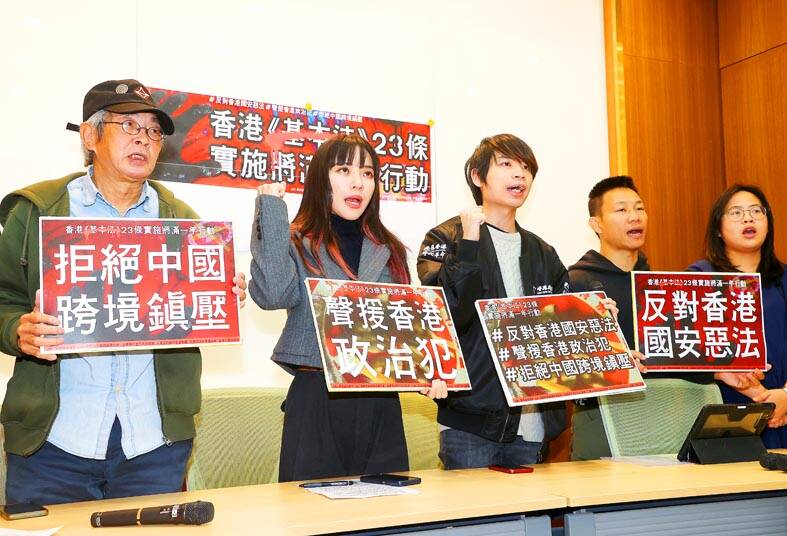A group of Hong Kongers living in Taiwan, known as the Hong Kong Outlanders, yesterday marked the first anniversary of the passage of Article 23 of the Hong Kong Basic Law by holding a news conference at the Legislative Yuan in Taipei in support of Hong Kongers arrested under the article.
Article 23 forbids any action undermining the sovereignty, the unity of territory, the safety and the solidarity of the People’s Republic of China, the group said.
It also forbids foreign political groups from conducting political activities within Hong Kong and banned Hong Kong-based political groups from establishing contact with foreign political groups, it said.

Photo CNA
Lam Wing-kee (林榮基), former owner of Causeway Bay Books, said the people of Hong Kong are beginning to understand that since Chinese President Xi Jinping (習近平) took office in 2012, “one country, two systems” existed only in name.
Hong Kong used to be prosperous and stable, but since Article 23 was implemented, the freedoms of Hong Kongers have become restricted, he said.
In essence, Article 23 overlaps with China’s National Security Law, allowing the Chinese government, and by extension, the Hong Kong government to accuse anyone of sedition, Lam said.
The passage of Article 23 meant that despite Hong Kong protesters leaving the territory, family members residing in Hong Kong are still prone to harassment from the local government, he said.
Fu Tong (赴湯) said that Hong Kongers have been warned that any misconduct would result in them being imprisoned once more, and they are monitored and warned not to attend gatherings and to go straight home after they leave work.
Other acquaintances posting on Facebook have also been warned not to contact Hong Kongers overseas, Fu said.
Democratic Progressive Party Legislator Huang Chieh (黃捷), who chairs the Taiwan Parliamentary Group for Hong Kong, criticized Article 23 for its restrictions, and for granting the Hong Kong government the power to detain and arrest others on baseless charges.
Amnesty International Taiwan secretary-general Chiu E-ling (邱伊翎) said Article 23 has granted the Chinese Communist Party the legal basis to suppress freedom of speech, citing how 13 Hong Kongers abroad have already had their passports revoked, been disbarred and prohibited from financial trading.
She urged the Chinese government to abolish the article and urged Taiwan to enact measures preventing Hong Kongers in Taiwan from being arrested.
Judicial Reform Foundation deputy chief executive officer Lee Ming-ju (李明洳) cited as an example the unreasonable detention of family members of Chow Hang-tung (鄒幸彤), a core member of the Hong Kong Alliance in Support of Patriotic Democratic Movements of China before its disbanding in 2021.
Lee said the family members were detained and are facing seven years in jail years for forwarding Facebook posts, or 10 years if the posts are deemed to be colluding with foreign forces.

The manufacture of the remaining 28 M1A2T Abrams tanks Taiwan purchased from the US has recently been completed, and they are expected to be delivered within the next one to two months, a source said yesterday. The Ministry of National Defense is arranging cargo ships to transport the tanks to Taiwan as soon as possible, said the source, who is familiar with the matter. The estimated arrival time ranges from late this month to early next month, the source said. The 28 Abrams tanks make up the third and final batch of a total of 108 tanks, valued at about NT$40.5 billion

Two Taiwanese prosecutors were questioned by Chinese security personnel at their hotel during a trip to China’s Henan Province this month, the Mainland Affairs Council (MAC) said yesterday. The officers had personal information on the prosecutors, including “when they were assigned to their posts, their work locations and job titles,” MAC Deputy Minister and spokesman Liang Wen-chieh (梁文傑) said. On top of asking about their agencies and positions, the officers also questioned the prosecutors about the Cross-Strait Joint Crime-Fighting and Judicial Mutual Assistance Agreement, a pact that serves as the framework for Taiwan-China cooperation on combating crime and providing judicial assistance, Liang

A group from the Taiwanese Designers in Australia association yesterday represented Taiwan at the Midsumma Pride March in Melbourne. The march, held in the St. Kilda suburb, is the city’s largest LGBTQIA+ parade and the flagship event of the annual Midsumma Festival. It attracted more than 45,000 spectators who supported the 400 groups and 10,000 marchers that participated this year, the association said. Taiwanese Designers said they organized a team to march for Taiwan this year, joining politicians, government agencies, professionals and community organizations in showing support for LGBTQIA+ people and diverse communities. As the first country in Asia to legalize same-sex

MOTIVES QUESTIONED The PLA considers Xi’s policies toward Taiwan to be driven by personal considerations rather than military assessment, the Epoch Times reports Chinese President Xi Jinping’s (習近平) latest purge of the Chinese People’s Liberation Army (PLA) leadership might have been prompted by the military’s opposition to plans of invading Taiwan, the Epoch Times said. The Chinese military opposes waging war against Taiwan by a large consensus, putting it at odds with Xi’s vision, the Falun Gong-affiliated daily said in a report on Thursday, citing anonymous sources with insight into the PLA’s inner workings. The opposition is not the opinion of a few generals, but a widely shared view among the PLA cadre, the Epoch Times cited them as saying. “Chinese forces know full well that